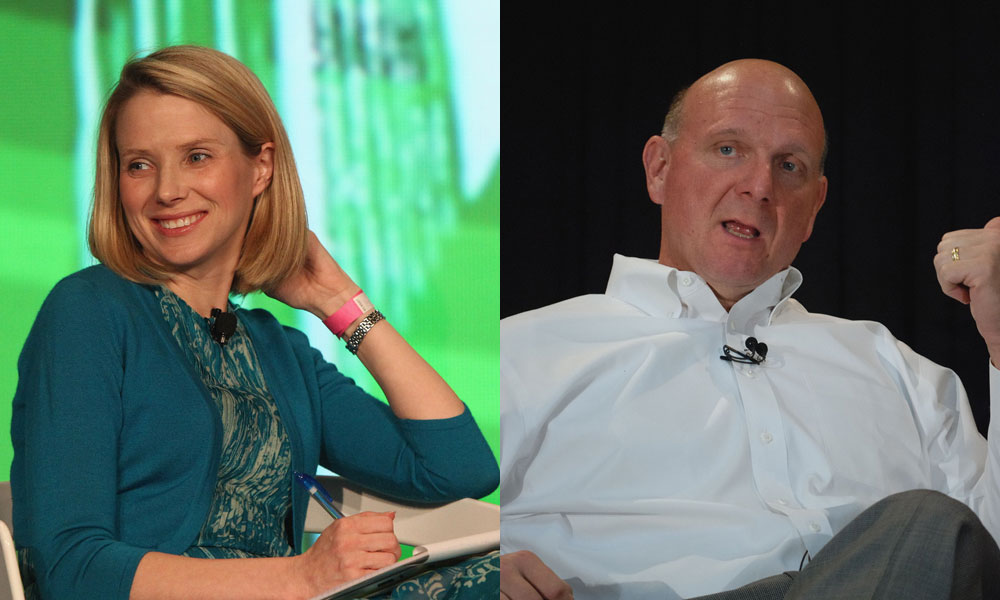
Polar Opposites: Comparing Marissa Mayer and Steve Ballmer
One has built a reputation on transforming a stagnant culture. The other has a focus on the bottom line that got short-term results but seems to have hurt innovation in the long run. Which would you want as your leader?
You couldn’t pick CEOs with leadership styles more different than Microsoft’s departing Steve Ballmer and rising Yahoo chief Marissa Mayer.
As shown in a lengthy piece by Business Insider published over the weekend, Mayer, who has been on the job for about a year, has become a transformative force for the company.
Mayer’s leadership strengths stand in sharp contrast to those of Ballmer, who announced his retirement last week and almost immediately saw his company’s stock price surge.
So what’s the difference here? Why are pundits so positive about Mayer but almost impatient for Ballmer (who made a ton of money for Microsoft) to leave?
Why are pundits so positive about Mayer but almost impatient for Ballmer (who made a ton of money for Microsoft) to leave?
And who has it right, anyway? Let’s ponder the differences.
A Tale of Two Cultures
What’s worse—working in a culture where intraoffice politics take over completely, or being forced to go to the office every single day?
These may be the two most controversial decisions Ballmer and Mayer, respectively, have made for their employees, but the difference is vast.
Ballmer’s “stack ranking” system, which forced Microsoft employees on the same team to compete with one another for bonuses and status in the company, may have been one of the company’s biggest cultural failings, according to Slate’s Will Oremus. The system, intended to encourage high performers to improve, actually discouraged collaboration and created a culture where toxic tactics (sabotage and brown-nosing) were rewarded. Ballmer defended the system just last month.
Mayer’s no-telecommuting decision, meanwhile, was controversial, but it came with a number of benefits. Mayer (picked as CEO instead of a candidate who wanted to cut staff significantly and change the company’s focus entirely) made other moves to boost morale—giving employees free food, holding weekly all-hands meetings, and going BYOD. Though derided in the press, the change on telecommuting was another part of this morale-boosting effort, as it helped open the communication lines. It might not work for your organization, but it worked for Yahoo.
Progress Reports
With the culture as a baseline, the two companies have taken differing approaches to success under their current leaders. But who’s doing it right?
In her first year, Mayer focused less on overarching strategy and more on building higher-quality products—particularly in the mobile sphere. One example is the company’s email app, which she played a direct role in building, brushing aside old cultural mores. “She was like ‘Yeah, yeah, yeah. We’ll get to that. Let’s first get some stuff out the door that actually works,’” one interviewee told Business Insider‘s Nicholas Carlson. As a result, many efforts, particularly the company’s Yahoo Weather app for the iPhone, received immense praise. And the company has beefed up its technology with a series of careful acquisitions—including Tumblr.
Ballmer, on the other hand, is a great short-game player, successfully building Microsoft’s status as a business-services company that holds its own next to firms like IBM. (Oh, yeah: Windows.) The problem is that this came at the cost of the market it was actually trying to reach—consumers. Outside of the Xbox, few of Microsoft’s consumer-first efforts have reached their intended audiences. This led to the company playing catch-up in markets where it actually had a claim on first-mover status, including phones and tablets. The company’s stock price under his leadership stagnated as a result.
What if Microsoft Bought Yahoo?
Over the weekend, tech writer Ben Thompson raised the prospect of what would happen if Apple were led by Steve Ballmer. “Bear with me, I know my premise is ridiculous,” he writes. Thompson’s point, however, was sound: He suggested that if Ballmer ran the company, it would be more financially profitable, but would eventually lose its relevance.
In 2008, under a different regime, Yahoo nearly became a part of Microsoft. Investors wanted the merger, but cofounder Jerry Yang, who was CEO at the time, prevented the sale. He faced withering criticism and eventually was forced to resign.
It took Yahoo a few years to find its footing, but one has to wonder if its recent turnaround after a long period of letting storied acquisitions fade out shows the value of cultivating a strong culture over chasing bottom-line results.
Did Yahoo dodge a cultural bullet by blocking the Microsoft sale and eventually finding Mayer? Or is Ballmer (who, again, made boatloads of money for Microsoft) getting short shrift in the comparison?
Let us know your take in the comments.
(photos by TechCrunch/Flickr, orcmid/Flickr)






Comments